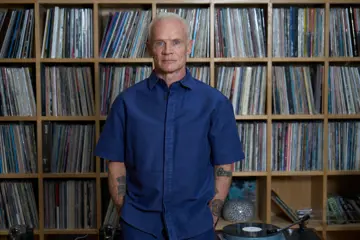 Mirel Wagner
Mirel Wagner"I'm so grateful — with all the concerts I've done — with how well people listen to the songs," says Finnish singer-songwriter Mirel Wagner. "How they can sit down, be quiet, relax, and just listen to the songs. It quite often happens where, even if I'm playing in a rock venue or a corner of a pub, people will still sit down and listen quietly."
The audience's reaction befits Wagner's music, which is quiet, intimate, melancholy. It also suits Wagner's softly spoken, shy personality. The 28 year old is a somewhat reluctant interviewee, and an almost accidental artist. Wagner cut her teeth writing songs as a teenager in the Helsinki suburbs, but never intended on a career. In turn, even though she's signed to legendary indie label Sub Pop and has released two albums — 2011's Mirel Wagner and 2014's When The Cellar Children See The Light Of Day — Wagner's music feels like something listeners can 'discover'.
"I never liked being the centre of attention. I'm more of a wallflower."
"I never considered making music as a career, it just sort of happened," Wagner admits. "And it's wonderful that it just happened. That I get to do this. Because it was never this ambition that I really, really wanted. Of course, it would have been a nice dream, but it never really seemed realistic. The kind of people who want to be musicians are often those people who crave a lot of fanfare. But I never liked being the centre of attention. I'm more of a wallflower. Writing songs was just always something that I did, something that I needed to do."
Where does this need, which in many ways runs contrary to her 'wallflower' personality, come from? "I don't know," Wagner considers. "I haven't really thought about it. It's probably something as simple as that, when I'm feeling bad about something, when I write a song about it, after that I feel really, really good. That's probably a huge reason."
Don't miss a beat with our FREE daily newsletter
The songs on When The Cellar Children See The Light Of Day are, befitting the title, filled with images of fathers and children, light and darkness, dirt and decay, angels and devils, birth and death. Its title seems to suggest the infamous case of Josef Fritzl, but that wasn't Wagner's intent. "I wasn't thinking about that specific story, which of course I've heard about," she offers. "I was thinking a little bit about life in a cult, or any situation in which death can be idealised."
When pressed about the specifics to any song, Wagner demurs, her quiet voice growing quieter, her reticence palpable. Given that many of the songs on her debut LP were ones she wrote as a teenager, she thinks a singular reading of any song is reductive. "Some of my songs have evolved so much over time," says Wagner. "They've been with me so long, and I'm so different, now, to how I was when I wrote them. Sometimes that change is quite literal — now I might play it differently, or sing it differently. But sometimes the meaning has changed, too. When you've recorded a song, that's always just one version of it. People who listen to [the recording] think it's the only one. But songs aren't just finished once they're on an album; they live on. There's always another version of a song, out there in the world."
















